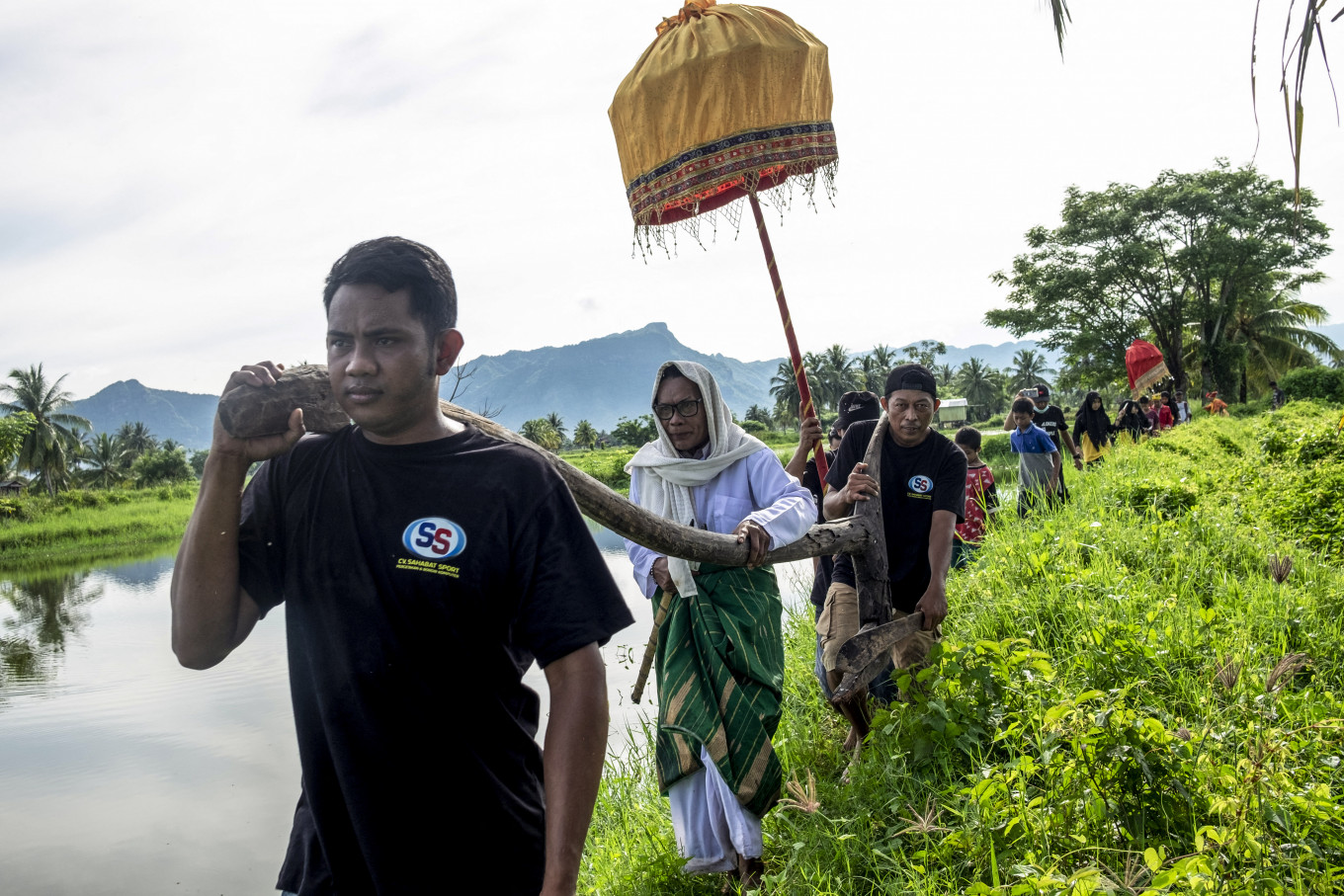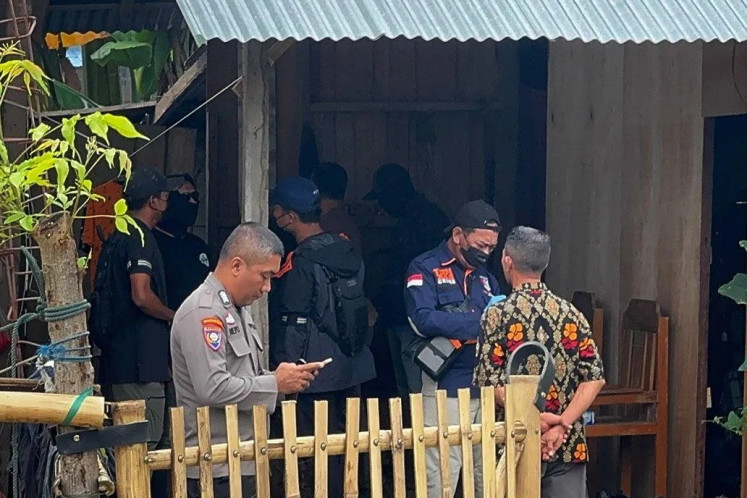Popular Reads
Top Results
Can't find what you're looking for?
View all search resultsPopular Reads
Top Results
Can't find what you're looking for?
View all search resultsNo land, no future: The dilemma facing rural youth
The government can do much in rural reform and revitalization to help the country's youth pursue their aspirations, whether they choose to contribute to agricultural and tourism development in villages, open entrepreneurial ventures or pursue advanced education to build better futures.
Change text size
Gift Premium Articles
to Anyone
E
very morning, Indah, 18, wakes early to catch the company bus from her coastal village in Maros, South Sulawesi. She travels for over one hour to a shrimp manufacturing warehouse in the urban outskirts of the provincial capital Makassar.
Despite living in a rural village, she does not have any land to establish herself in farming. She works at a factory, just like many other young women in her village, as there are few options left.
The rural landscape has changed rapidly, driven by expanding urbanization, mining activities, commodity crops and infrastructure development displacing once-fertile agricultural land. As a result, fewer rural young people have access to adequate amounts of farmland to make a viable living from agriculture alone, and lingering informality in the workplace makes stable off-farm employment difficult to find.
Indah’s story is representative of many youth in rural Indonesia who are seeking new pathways to achieve their livelihood hopes and aspirations.
To understand the changing nature of young people’s livelihoods, aspirations and hopes, we conducted in-depth fieldwork in four villages spanning different geographies in Maros regency. In each village, we heard how young people, including Indah, faced similar challenges as they imagine, realize and recalibrate their future aspirations.
Over the past few decades, Maros has undergone rapid agrarian and economic changes. The creation of Bantimurung-Bulusaraung National Park has limited local communities' access to candlenut forests. Additionally, the conversion of rice fields into shrimp ponds during the 1990s shrimp boom led to soil degradation and dependency on unstable commodities.
These changes, along with the expansion of mines, railways, factories and housing on productive farmland, have pushed rural youth away from land-based livelihoods. Today, they are increasingly drawn to retail and manufacturing jobs in cities or consider migrating to other islands.
This situation means that education is seen as a gateway to “modern” jobs outside agriculture. Finishing senior high school is considered essential to secure a dream job, whether as a civil servant, salaried retail worker or in mechanically oriented jobs.
However, educational achievements do not always guarantee the anticipated pathways to a better future. Local job market conditions do not always deliver for educated youth. As a result, many young people seek creative pathways to employment, entrepreneurship or “escape” to cities, even abroad.
Our research documented the trajectories that rural youth pursue.
Factory work in local industrial parks, such as Makassar Industrial Estate (KIMA), is an increasingly important livelihood for rural young women lacking access to land or the finances needed to study. These women are collected from the village by a company bus at 6 a.m. They work in a shrimp processing factory from 8 a.m. until 5 p.m., sometimes continuing with overtime shifts until 10 p.m. While the availability of this work is reasonably steady, workers lack formal contracts.
A 19-year-old woman working in shrimp processing said, “Actually, I want to work at a convenience store, but only those who have the money to continue through to high school can. If you have lower levels of schooling, you have to go to KIMA.”
Many rural youth choose migration to pursue a better future. Sometimes, they keep one foot in either world as they cyclically move between rural village life, fishing, plantation work or urban opportunities.
Young women have found work as domestic helpers in Saudi Arabia and Malaysia while others commute to factories in Makassar’s industrial zone. Meanwhile, young men secure jobs in oil palm plantations, laboring for land conversions, transportation or construction work across Sulawesi, Papua, Kalimantan or Malaysia.
Some migrate closer to home to towns like Maros and Makassar to access schools, universities, laboring jobs, manufacturing work or opportunities as drivers and mechanics.
One 42-year-old male landowner remarked, “The unemployment rate here is high. If young people don’t migrate, they will stay unemployed in the village.”
Youth also respond to the uncertainty of agriculture and labor force opportunities through the pursuit of entrepreneurial activities. Becoming an entrepreneur is seen as a pathway to business ownership, financial stability and a better rural future. These pursuits may involve opening small automobile workshops or fashion boutiques, trading petty goods on social media platforms or running tourism ventures, all in the village.
“Even if it’s a small business, if that person is the boss, that’s a successful person,” said a 30-year-old male entrepreneur.
Indonesia’s rural youth do not reject education or hard work, but their social and economic conditions often limit their options. These include access to land and agricultural capital, as well as the ability to secure finances for tertiary education. Despite these challenges, they continue to shape their lives through hope, recalibrating their aspirations to the realities they face.
Rural youth are not passive, and actively pursue their hopes for a better future, whether through migration, local entrepreneurship, education or for some, farm ownership.
Listening to the hopes of South Sulawesi’s rural youth teaches us an important lesson: Development must go beyond infrastructure. We need to understand how youth envision their futures and support their choices, including those who choose to stay in their villages, through fair and inclusive policies.
Indonesia could actively support young people to prosper in rural areas through ongoing investment in rural revitalization policies, improving access to land, capital, education, job opportunities and social services in rural areas.
Our research shows that youth are still interested in farming, yet they require access to an adequate amount of securely tenured farmland and capital to realize this opportunity.
If we are serious about making rural areas viable places to live, greater efforts are needed to sustain rural opportunities for young people. The voices and hopes of rural youth deserve to be heard, not pitied.
---
Christina Griffin is a research fellow at the Crawford School of Public Policy at the Australian National University. Muhammad Alif K. Sahide is head of the Forest and Society Research Group at Hasanuddin University, where Nurhady Sirimorok is a researcher. Wolfram Dressler is a human geography professor at the University of Melbourne. This article is republished under a Creative Commons license.











